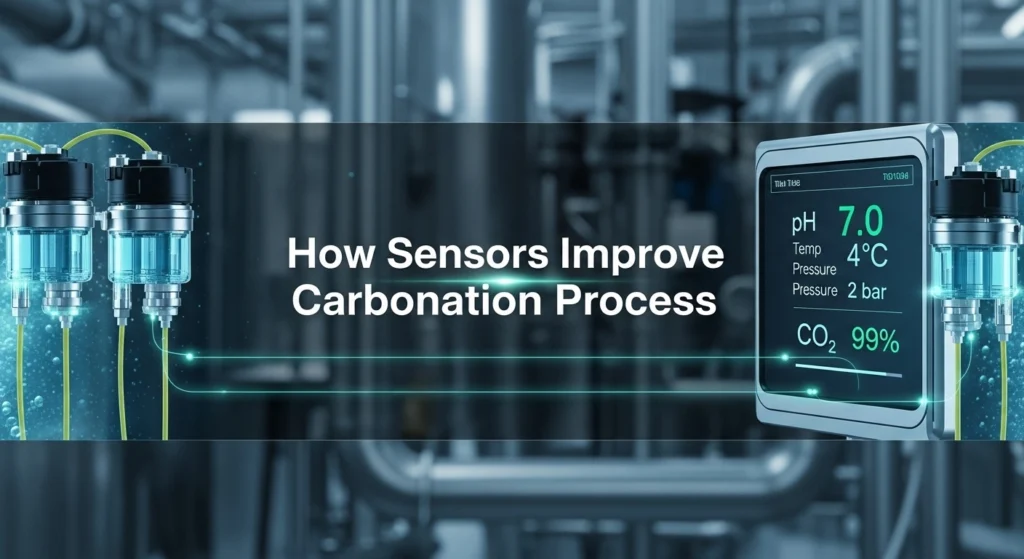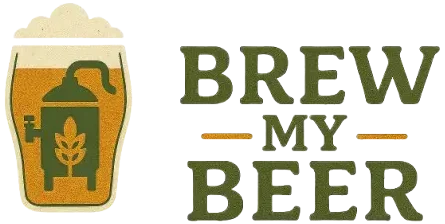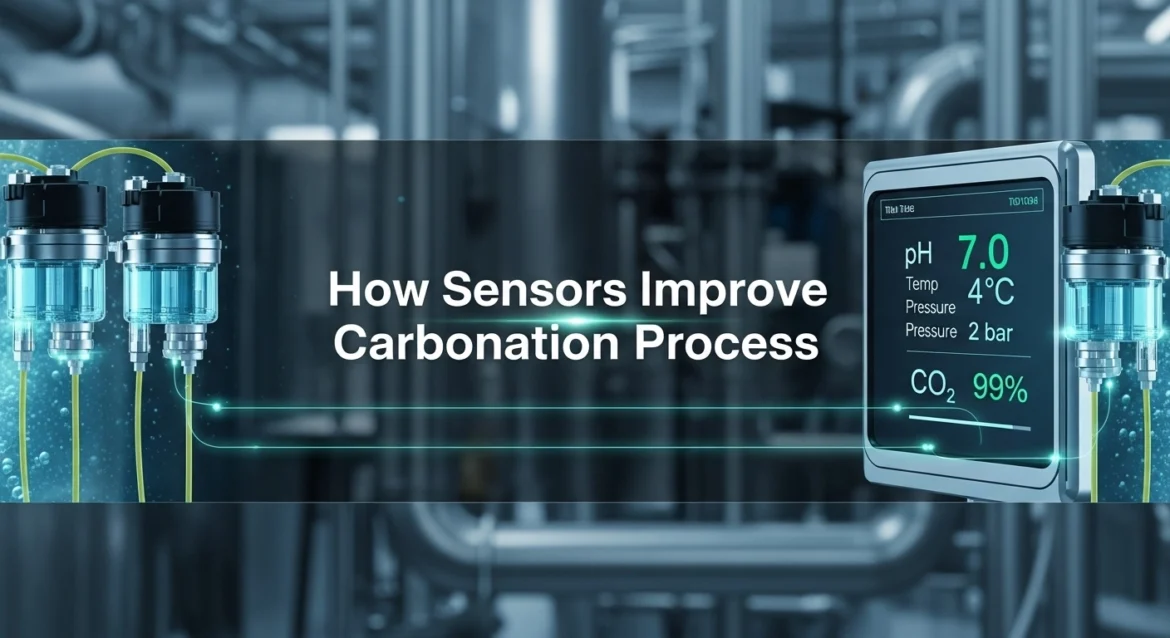Discover how sensors improve carbonation process through precise CO2 monitoring, pressure control, and automated systems that ensure perfect beer carbonation levels and consistent quality.

Sensors improve carbonation process by providing real-time monitoring and precise control of CO2 levels, pressure, and temperature throughout beer conditioning while eliminating guesswork and ensuring consistent carbonation that meets exact quality standards batch after batch. After implementing various sensor technologies across multiple brewery operations over the past six years, I can confidently state that intelligent carbonation monitoring represents the most significant advancement in beer quality control, enabling breweries to achieve perfect carbonation levels while reducing waste and improving customer satisfaction.
My experience with carbonation sensors began with inconsistent CO2 levels that plagued early brewing attempts, resulting from manual pressure adjustments and timing estimates that failed to account for temperature variations and system dynamics. The breakthrough came when I discovered that comprehensive sensor networks could monitor dissolved CO2 in real-time while providing automated feedback control that maintained optimal carbonation conditions throughout conditioning and packaging processes.
This comprehensive analysis explores how modern sensor technology transforms carbonation processes through intelligent monitoring, automated control systems, and data-driven optimization that ensures perfect beer carbonation while reducing costs and improving operational efficiency. Understanding these technologies enables breweries to leverage sensor capabilities for enhanced quality control while building systematic approaches to carbonation management that support consistent product excellence.
Whether you’re managing craft brewery operations or optimizing large-scale production, mastering sensor-based carbonation control provides competitive advantages through improved quality consistency, reduced waste, and enhanced customer satisfaction that drives business success.
Understanding Carbonation Process Fundamentals
Carbonation process involves dissolving CO2 into beer under controlled pressure and temperature conditions while achieving target dissolved CO2 levels that determine mouthfeel, flavor release, and overall beer quality through precise control of physical and chemical parameters.
Henry’s Law and CO2 Solubility
CO2 solubility follows Henry’s Law principles where dissolved gas concentration varies directly with partial pressure at constant temperature while temperature changes create non-linear solubility variations that require precise control for consistent carbonation levels.
Pressure and Temperature Relationships
Carbonation equilibrium depends on both pressure and temperature while increasing pressure linearly increases CO2 solubility and decreasing temperature exponentially increases dissolution rates, requiring coordinated control of both parameters for optimal results.
Carbonation Measurement Standards
CO2 levels are measured in volumes of CO2 per volume of beer where one volume equals one liter of CO2 dissolved per liter of beer at standard conditions while typical beer ranges from 2.2 to 2.8 volumes depending on style requirements.
Process Dynamics and Timing
Carbonation rates decrease exponentially as equilibrium approaches while achieving target levels requires precise timing and monitoring to prevent over-carbonation or under-carbonation that affects beer quality and consumer acceptance.
For comprehensive carbonation process guidance and advanced sensor integration techniques, explore the precision brewing control resources at BrewMyBeer’s carbonation technology section, where traditional brewing expertise meets modern sensor innovation.
Real-Time CO2 Monitoring Technology
Inline CO2 sensors provide continuous measurement of dissolved carbon dioxide throughout carbonation processes while eliminating manual sampling requirements and providing instant feedback for process optimization and quality control applications.
Thermal Conductivity Sensor Technology
Mettler Toledo’s InPro 5500i uses thermal conductivity measurement to determine CO2 concentration in beer and carbonated beverages while providing accurate, reliable measurements that support automated control systems and quality assurance protocols.
Optical CO2 Measurement Systems
Anton Paar’s Carbo series employs optical measurement principles that deliver results within four seconds while providing maintenance-free operation and EHEDG certification for hygienic brewery applications requiring high accuracy and reliability.
Manometric CO2 Detection
Traditional manometric sensors measure CO2 through pressure differential methods while providing proven accuracy and reliability for carbonation monitoring applications that require established measurement techniques.
Multi-Gas Measurement Capabilities
Advanced sensor systems detect multiple dissolved gases including CO2, nitrogen, and nitrous oxide while providing comprehensive beverage analysis for specialized applications requiring complex gas management and monitoring.
Digital Sensor Integration
Modern CO2 sensors incorporate digital technology that simplifies installation and provides enhanced data communication while reducing lifecycle costs through improved durability and extended calibration intervals.
| Sensor Technology | Response Time | Accuracy | Maintenance | Application |
|---|---|---|---|---|
| Thermal Conductivity | 30-60 seconds | ±0.1 volumes | Moderate | General brewing |
| Optical Measurement | 4 seconds | ±0.05 volumes | Minimal | High-precision control |
| Manometric Method | 10-30 seconds | ±0.1 volumes | Regular | Traditional brewing |
| Multi-Gas Systems | 5-15 seconds | ±0.05 volumes | Low | Specialized beverages |
| Digital Sensors | Variable | High | Low | Automated systems |
Pressure Sensor Applications in Carbonation
Pressure sensors monitor and control carbonation pressure throughout conditioning processes while ensuring optimal CO2 absorption and preventing over-pressurization that could compromise product quality or safety requirements.
Fermentation Pressure Monitoring
Pressure sensors track CO2 production during fermentation while providing insights into yeast health and fermentation progress that enable optimal timing for conditioning and carbonation procedures.
Bright Beer Tank Control
Pressure sensors maintain desired carbonation levels in bright beer tanks while ensuring consistent CO2 absorption and preventing pressure fluctuations that could affect final product quality and carbonation consistency.
Safety and Equipment Protection
Pressure monitoring prevents dangerous over-pressurization while protecting equipment and personnel through automatic pressure relief and system shutdown capabilities that maintain safe operating conditions.
Packaging Pressure Optimization
Precise pressure control during packaging prevents foam-over while ensuring consistent fill levels and reducing product waste through optimal pressure management during bottling and canning operations.
XDB401 Professional Pressure Sensor
The XDB401 offers ±0.25% accuracy across 0-145 psi range with stainless steel construction and IP67 rating while providing multiple output options for seamless integration with existing control systems.
Temperature Control and Monitoring
Temperature sensors ensure optimal carbonation conditions throughout conditioning while maintaining precise thermal control that maximizes CO2 solubility and ensures consistent carbonation levels across different beer styles and production requirements.
Conditioning Temperature Management
Temperature control during conditioning affects CO2 absorption rates while maintaining optimal ranges typically below fermentation temperatures but above freezing ensures proper carbonation development without compromising beer quality.
Multi-Point Temperature Monitoring
Comprehensive temperature sensor networks monitor thermal stratification in large conditioning tanks while ensuring uniform temperature distribution that promotes consistent CO2 dissolution throughout the entire beer volume.
Automated Temperature Control Systems
Integrated temperature control systems respond automatically to sensor data while maintaining optimal carbonation conditions through precise heating and cooling adjustments that optimize CO2 solubility and absorption rates.
Thermal Profile Optimization
Different beer styles require specific temperature profiles during carbonation while sensor-controlled systems enable precise thermal management that optimizes carbonation characteristics for each beer type and style requirement.
Energy Efficiency Monitoring
Temperature sensors support energy optimization through efficient heating and cooling control while reducing operational costs and environmental impact through intelligent thermal management and energy consumption optimization.
Automated Carbonation Control Systems
Automated control systems integrate multiple sensors to maintain optimal carbonation conditions while eliminating manual intervention and providing consistent results through intelligent feedback control and process optimization algorithms.
Closed-Loop Control Implementation
Automated carbonation systems use sensor feedback to adjust CO2 injection rates and pressure levels while maintaining target carbonation through continuous monitoring and automatic adjustment that ensures consistent quality without operator intervention.
Multi-Parameter Integration
Advanced control systems coordinate pressure, temperature, and flow sensors while optimizing carbonation through comprehensive process control that accounts for all variables affecting CO2 dissolution and beer quality.
Predictive Control Algorithms
Intelligent control systems predict carbonation requirements based on historical data and current conditions while proactively adjusting process parameters to achieve target carbonation levels efficiently and consistently.
Recipe-Based Control Programming
Automated systems support different carbonation profiles for various beer styles while enabling programmable control sequences that optimize carbonation for specific products and quality requirements.
Real-Time Process Optimization
Continuous sensor monitoring enables dynamic process optimization while adjusting carbonation parameters in real-time to maintain optimal conditions and compensate for variations in temperature, pressure, or beer composition.
Quality Control and Consistency Enhancement
Sensor-based quality control systems ensure carbonation consistency through continuous monitoring and automated adjustment while maintaining product standards that meet customer expectations and regulatory requirements across all production batches.
Batch-to-Batch Consistency
Comprehensive sensor monitoring ensures consistent carbonation across multiple batches while eliminating variations that affect product quality and customer satisfaction through systematic process control and monitoring.
Statistical Process Control Integration
Sensor data supports statistical quality control through comprehensive data collection and analysis while identifying trends and variations that require process adjustment or equipment maintenance to maintain quality standards.
Real-Time Quality Monitoring
Continuous CO2 measurement provides immediate quality feedback while enabling rapid response to deviations that could affect product quality and allowing corrective action before problems impact customer products.
Automated Quality Documentation
Sensor systems generate comprehensive quality records that support regulatory compliance and quality assurance while providing audit trails and documentation essential for quality investigations and process optimization.
Deviation Detection and Alerts
Intelligent monitoring systems detect carbonation deviations immediately while providing automatic alerts and notifications that enable rapid response and prevent quality issues from affecting finished products.
How Sensors Improve Carbonation Process Safety and Compliance Applications
CO2 monitoring systems ensure workplace safety while protecting employees from dangerous CO2 concentrations that can accumulate in brewery environments during fermentation and carbonation operations.
Ambient CO2 Safety Monitoring
Fixed CO2 detectors monitor ambient air quality in fermentation and storage areas while providing automatic ventilation activation and personnel alerts when CO2 concentrations exceed safe levels for human occupancy.
Walk-In Cooler Protection
CO2 monitors in beer coolers detect gas leaks from dispensing systems while providing early warning of accumulation that could create dangerous conditions for personnel entering confined spaces.
Regulatory Compliance Support
Comprehensive monitoring systems support regulatory compliance requirements while providing documentation and safety records that meet occupational health and safety standards for brewery operations.
Emergency Response Integration
Safety monitoring systems integrate with emergency response protocols while providing automatic alerts and evacuation procedures that protect personnel during CO2 leak incidents or equipment malfunctions.
Personal Safety Equipment
Portable CO2 monitors protect individual workers in high-risk areas while providing personal safety alerts and documentation for workers entering tanks, confined spaces, or high-CO2 environments.
Advanced Sensor Integration and IoT
Internet of Things (IoT) integration enhances sensor capabilities through cloud connectivity and remote monitoring while providing comprehensive data analysis and predictive maintenance capabilities that optimize carbonation processes.
Cloud-Based Monitoring Platforms
IoT-enabled sensors provide remote access to carbonation data while enabling off-site monitoring and control that supports multi-location brewery management and expert consultation from remote locations.
Predictive Maintenance Systems
Sensor data analytics predict equipment maintenance needs while identifying performance trends that indicate required calibration, cleaning, or replacement before sensor accuracy degrades or equipment fails.
Mobile App Integration
Smartphone applications provide portable access to carbonation monitoring while enabling real-time alerts and remote system adjustment that supports flexible brewery management and immediate response capabilities.
Data Analytics and Machine Learning
Advanced analytics platforms process sensor data to identify optimization opportunities while machine learning algorithms improve carbonation control through pattern recognition and automated process optimization.
Integration with Brewery Management Systems
Comprehensive brewery software integrates sensor data with production planning while coordinating carbonation processes with overall brewery operations and quality management systems.
Cost-Benefit Analysis and ROI
Sensor implementation provides measurable returns through improved quality, reduced waste, and operational efficiency while supporting brewery growth and competitiveness through enhanced process control and product consistency.
Quality Improvement Benefits
Consistent carbonation reduces customer complaints and returns while improving brand reputation and customer satisfaction through reliable product quality that meets expectations and supports premium pricing strategies.
Waste Reduction and Efficiency Gains
Precise carbonation control reduces over-carbonation waste while optimizing CO2 usage and preventing product losses that occur from carbonation errors and foam-over incidents during packaging.
Labor Cost Savings
Automated monitoring reduces manual testing requirements while enabling staff focus on value-added activities and reducing labor costs associated with manual carbonation monitoring and adjustment procedures.
Equipment Protection and Maintenance
Sensor monitoring prevents equipment damage from over-pressurization while extending equipment life and reducing maintenance costs through early problem detection and preventive intervention.
Regulatory Compliance Cost Reduction
Comprehensive monitoring simplifies regulatory compliance while reducing audit costs and regulatory risks through automated documentation and systematic safety monitoring that meets industry standards.
Implementation Strategies and Best Practices
Successful sensor implementation requires systematic planning and phased deployment while ensuring proper integration with existing systems and adequate staff training for optimal utilization and maintenance.
Phased Implementation Approach
Gradual sensor deployment enables systematic integration while building expertise and demonstrating value before expanding to comprehensive monitoring systems that cover all carbonation processes and quality control requirements.
Sensor Selection and Specifications
Appropriate sensor selection matches application requirements with pressure ranges from 0-3 bars for fermentation and 6+ bars for carbonation while considering accuracy, maintenance, and integration requirements for specific brewery applications.
Calibration and Maintenance Protocols
Regular calibration ensures sensor accuracy while systematic maintenance procedures and replacement schedules maintain performance and extend sensor life through proper care and attention.
Staff Training and Change Management
Comprehensive training ensures effective sensor utilization while change management strategies build acceptance and competency in sensor-based carbonation control and monitoring procedures.
Integration with Existing Systems
Sensor integration with current brewery systems requires careful planning while ensuring compatibility and seamless data flow that enhances rather than complicates existing brewery operations and workflows.
Future Trends and Technology Evolution
Carbonation sensor technology continues advancing through enhanced accuracy, reduced maintenance requirements, and improved integration capabilities while supporting emerging applications in craft brewing and specialized beverage production.
Artificial Intelligence Integration
AI-powered sensor systems provide predictive carbonation control while learning from historical data to optimize processes and predict maintenance requirements through intelligent analysis and automated optimization.
Wireless Sensor Networks
Advanced wireless sensors eliminate installation complexity while providing flexible monitoring solutions that adapt to changing brewery layouts and expansion requirements without extensive rewiring.
Enhanced Multi-Parameter Sensors
Next-generation sensors monitor multiple parameters simultaneously while providing comprehensive carbonation analysis through integrated measurement of CO2, pressure, temperature, and flow in single sensor packages.
Blockchain Integration for Quality Assurance
Blockchain technology may provide tamper-proof quality records while ensuring data integrity and supporting comprehensive quality tracking from carbonation through distribution and consumption.
Nano-Sensor Development
Miniaturized sensors enable monitoring in smaller vessels while providing high-accuracy measurement in space-constrained applications and supporting craft brewery operations with limited tank access.
Conclusion and Strategic Implementation
Sensors improve carbonation process significantly when implemented systematically with appropriate technology selection, comprehensive training, and integration strategies that enhance brewery operations while maintaining product quality and operational efficiency.
Begin with essential CO2 monitoring and pressure control sensors while building systematic carbonation management capabilities that provide foundation for advanced automation and quality control systems.
Invest in proven sensor technologies from established manufacturers like Mettler Toledo, Anton Paar, and XDB while ensuring adequate support for installation, calibration, and ongoing maintenance throughout sensor lifecycles.
Focus on staff training and change management that ensures effective sensor utilization while building organizational competency in sensor-based carbonation control and quality management practices.
Remember that sensor success depends on systematic implementation and ongoing maintenance while maintaining focus on quality improvement and operational efficiency rather than technology complexity.
The investment in carbonation sensor systems provides competitive advantages through improved consistency, reduced waste, and enhanced quality control that support brewery growth and customer satisfaction.
Choose sensor solutions based on actual operational requirements and quality objectives while ensuring adequate support for training, maintenance, and continuous improvement throughout technology lifecycles.
About the Author
Ryan Brewtech bridges the gap between traditional brewing and cutting-edge technology. With a background in computer engineering and extensive experience in IoT development, Ryan specializes in designing automated brewing systems that improve consistency while maintaining craft quality. He has personally implemented and evaluated numerous sensor systems across various brewery operations, providing practical insights into carbonation monitoring, process control, and quality optimization that genuinely enhance brewing outcomes. Ryan’s expertise encompasses both hardware integration and software development, enabling him to create comprehensive sensor solutions that enhance rather than complicate traditional brewing processes.
His systematic approach to brewery automation has helped thousands of brewers implement sophisticated carbonation monitoring systems at affordable costs while preserving the craftsmanship that defines exceptional beer. Ryan regularly evaluates new sensor technologies and automation systems, separating genuine innovations from marketing hype through systematic testing and real-world brewery applications. When not designing sensor networks or programming brewing automation systems, Ryan enjoys exploring how modern technology can enhance traditional brewing methods while preserving the quality and authenticity that makes brewing both rewarding and satisfying. Contact Ryan at [email protected] or explore his comprehensive brewing guides and sensor technology resources at brewmybeer.online.

